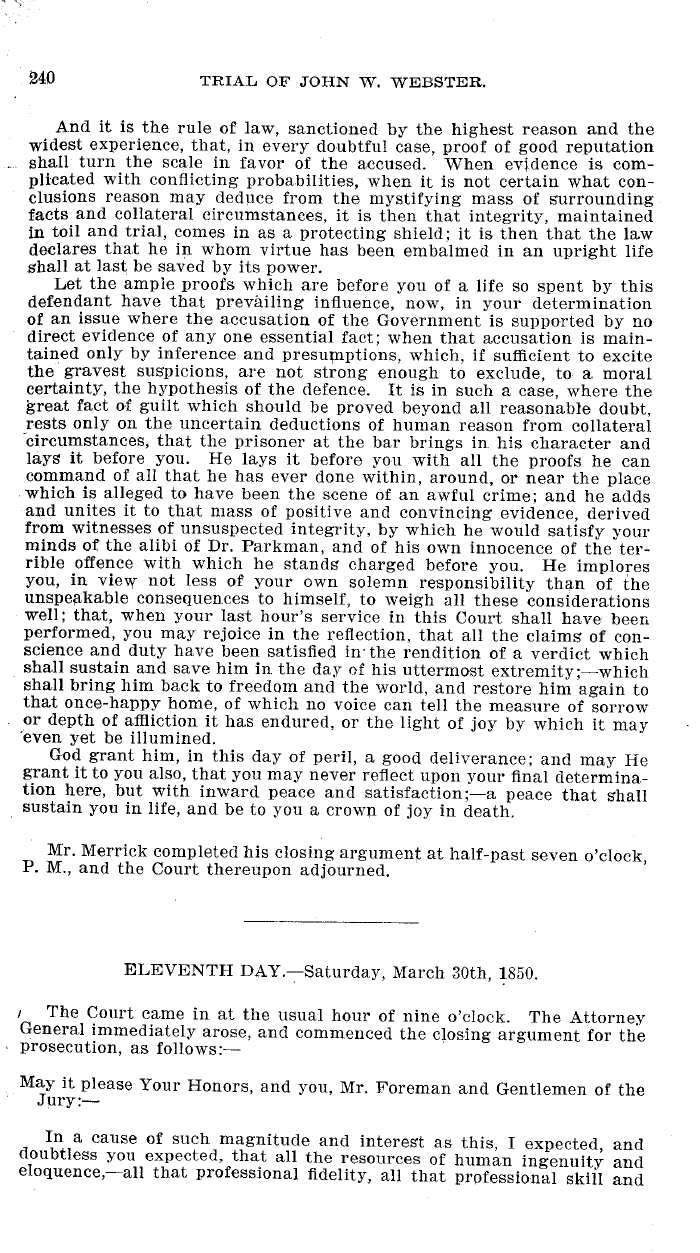|
24A TRIAL OF JOHN W. WEBSTER.
And it is the rule of law, sanctioned by the highest reason and the
widest experience, that, in every doubtful case, proof of good reputation
shall turn the scale in favor of the accused. When evidence is com-
plicated with conflicting probabilities, when it is not certain what con-
clusions reason may deduce from the mystifying mass of surrounding
facts and collateral circumstances, it is then that integrity, maintained
in toil and trial, comes in as a protecting shield; it is then that the law
declares that he in whom virtue has been embalmed in an upright life
shall at last be saved by its power.
Let the ample proofs which are before you of a life so spent by this
defendant have that prevailing influence, now, in your determination
of an issue where the accusation of the Government is supported by no
direct evidence of any one essential fact; when that accusation is main-
tained only by inference and presumptions, which, if sufficient to excite
the gravest suspicions, are not strong enough to exclude, to a moral
certainty, the hypothesis of the defence. It is in such a case, where the
great fact of guilt which should be proved beyond all reasonable doubt,
rests only on the uncertain deductions of human reason from collateral
circumstances, that the prisoner at the bar brings in his character and
lays it before you. He lays it before you with all the proofs he can
command of all that he has ever done within, around, or near the place
which is alleged to have been the scene of an awful crime; and he adds
and unites it to that mass of positive and convincing evidence, derived
from witnesses of unsuspected integrity, by which he would satisfy your
minds of the alibi of Dr. Parkman, and of his own innocence of the ter-
rible offence with which he stands charged before you. He implores
you, in view not less of your own solemn responsibility than of the
unspeakable consequences to himself, to weigh all these considerations
well; that, when your last hour's service in this Court shall have beer.
performed, you may rejoice in the reflection, that all the claims of con-
science and duty have been satisfied in the rendition of a verdict which
shall sustain and save him in the day of his uttermost extremity; which
shall bring him back to freedom and the world, and restore him again to
that once-happy home, of which no voice can tell the measure of sorrow
or depth of affliction it has endured, or the light of joy by which it may
'even yet be illumined.
God grant him, in this day of peril, a good deliverance; and may He
grant it to you also, that you may never reflect upon your final determina-
tion here, but with inward peace and satisfaction;-a peace that shall
sustain you in life, and be to you a crown of joy in death.
Mr. Merrick completed his closing argument at half-past seven o'clock,
P. M., and the Court thereupon adjourned.
ELEVENTH DAY.-Saturday, March 80th, 1850.
i The Court came in at the usual hour of nine o'clock. The Attorney
General immediately arose, and commenced the closing argument for the
prosecution, as follows:-
May it please Your Honors, and you, Mr. Foreman and Gentlemen of the
Jury:-
In a cause of such magnitude and interest as this, I expected, and
doubtless you expected, that all the resources of human ingenuity and
eloquence, all that professional fidelity, all that professional skill and
|

